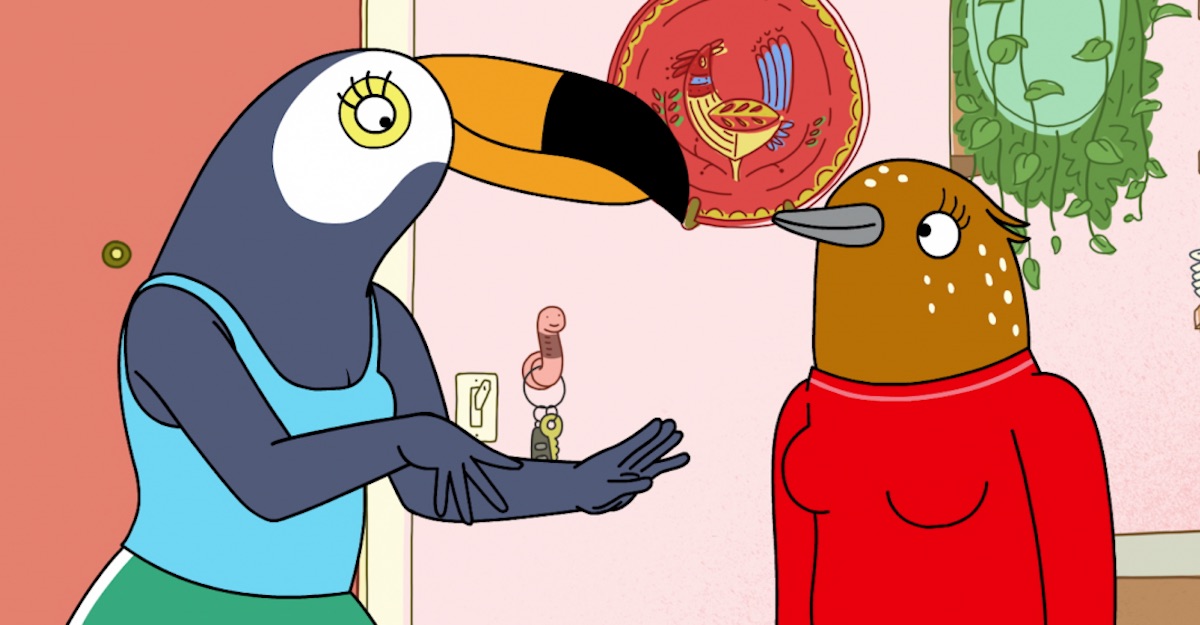Tuca & Bertie Has the Only Sexual Assault Storyline That Matters Right Now

Rape storylines have been trending in prestige shows such as the now-ended juggernaut Game of Thrones, and not-so-prestige shows such as SVU for years, but we haven’t seen an iteration like the one on Tuca and Bertie yet. Often, the storyline is either our character’s motivation to become “strong” or a means to add drama to an otherwise dull storyline. Tuca and Bertie’s take on the subject rises above this, focusing on much more than the sexual assault itself.
It’s about friends reconciling, the nature of art, and taking back what has been taken from you. The animated dramedy is an odd couple story about two different birds (literally): Bertie, an uptight song thrush with big bakery dreams, and her friend Tuca, a toucan free spirit who works gigs and parties hard. Tuca and Bertie have been through a lot in this season—Bertie realizes her dream of working in a bakery with the famous Pastry Pete, but realizes that he’s a creeper after he harasses a new friend of hers. Tuca breaks with the alcoholic aunt she has been mooching off of and is fighting to live her life sober.
This particular episode, “The Jelly Lakes,” begins as the two friends are taking a road trip in the aftermath of a potentially friendship-ending fight. The two of them have clashed as Bertie’s priorities have changed over the season, hurting the freewheeling Tuca.
In the car, you can see their anxious expressions as they try to fit each other back into their lives. They make a pitstop at a mall, and encounter a figure from the past—Bertie’s former swim coach, who wonders why Bertie lost interest in swimming to Peanut Butter Island. As the girls leave the mall, and go Coach Maple’s cabin, where they meet her wife Pat, who is an owl who enjoys making detailed scenes on broken eggs, we get a lot of shots of Peanut Butter island itself—off in the distance, menacing Bertie and us.
The usual visual style of the show is busy—full of visual gags and clutter. A typical episode might have several plant-headed people dancing in the background as Tuca manically shouts out some new sounds that she is workshopping. This episode pares down the visual extravaganza . The simplicity of Pat’s eggs gives us a great visual style to go off of as we reach our reveal. They are simple one or two color pieces, with broad outlines.
When Bertie reveals that she was assaulted by a lifeguard and thus never got to swim to her goal, the world becomes like the egg Tuca is holding: brown and black branches, the lifeguard just a silhouette. The only thing that stands out is her bright red swimsuit blowing in the wind.
This is beautiful visual storytelling. Instead of focusing on her abused body or the monstrousness of the abuse of trust, the viewer sees it all through Bertie’s eyes, and that is what many rape storylines are missing—the victim’s subjectivity. Bertie is not seeing herself through the camera’s eyes. The camera is seeing through Bertie’s.
Tuca encourages her to make the island hers, for it to be Peanut BERTIE Island. Bertie’s attempt is not played for comedy. Instead of being alone, she is supported by Coach Maple, Pat and Tuca, with Coach Maple occasionally carrying Bertie on her shoulders. Another beautiful visual is when Bertie sinks down into the water, and it becomes the brown and grey pines of the woods.
She sees her younger self on the bottom, and gains strength from her. The energy she has gotten from her younger self is like a corona. With that strength, she is able to take back the island, and they create a new egg. Not one of brokenness, but one that is whole and complete. This episode shows how one can survive rape with the help and strength of a community of women, but does not make it into Bertie’s superpower or a backstory that explains everything about her.
Not everything is all right, but she has taken back something important, and that is the answer.
S.R. Westwood is a Memphis based freelancer. She spends her time rewatching Utena and writing poetry for her Patreon at https://www.patreon.com/cassowaryjeweler.
Want more stories like this? Become a subscriber and support the site!
—The Mary Sue has a strict comment policy that forbids, but is not limited to, personal insults toward anyone, hate speech, and trolling.—
Have a tip we should know? tips@themarysue.com